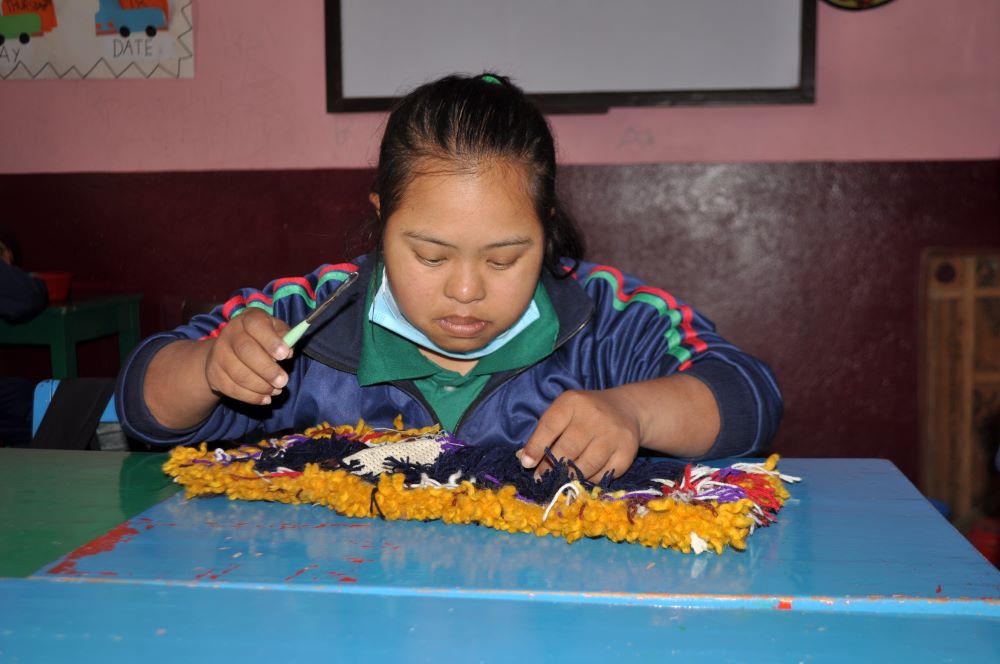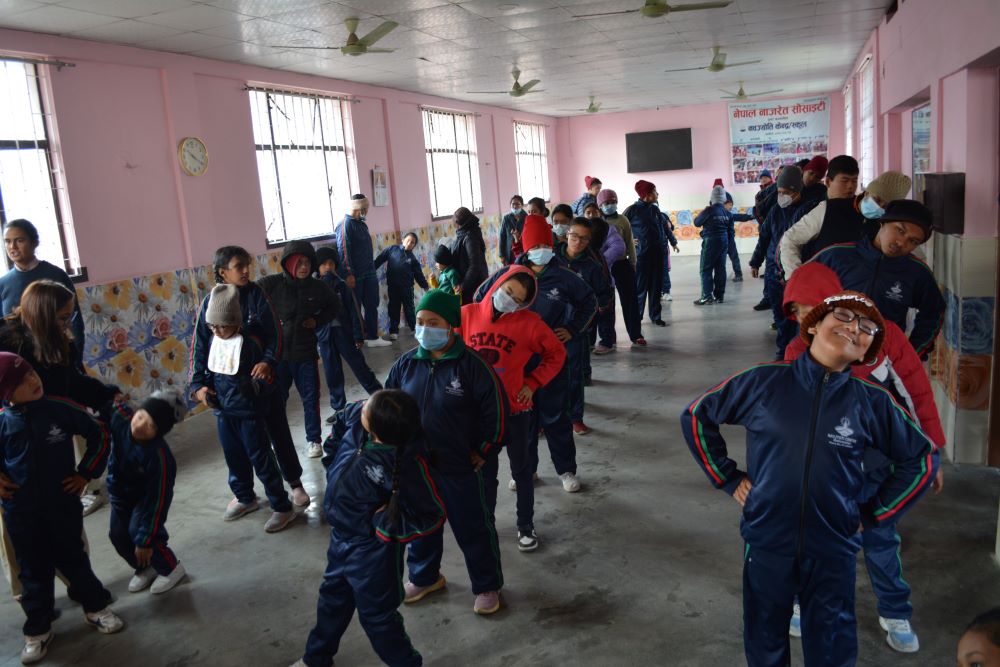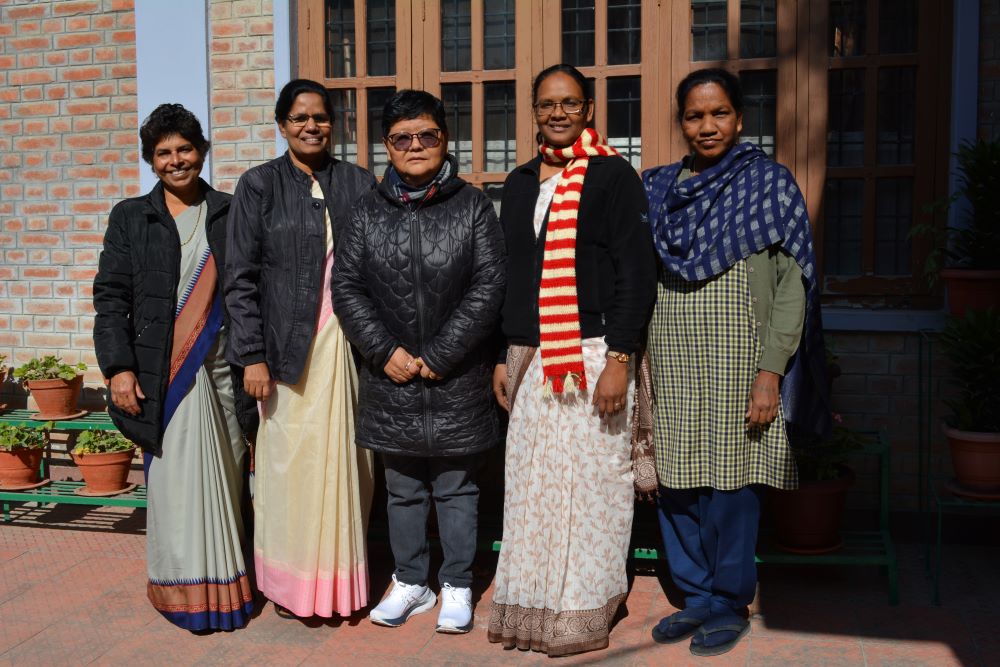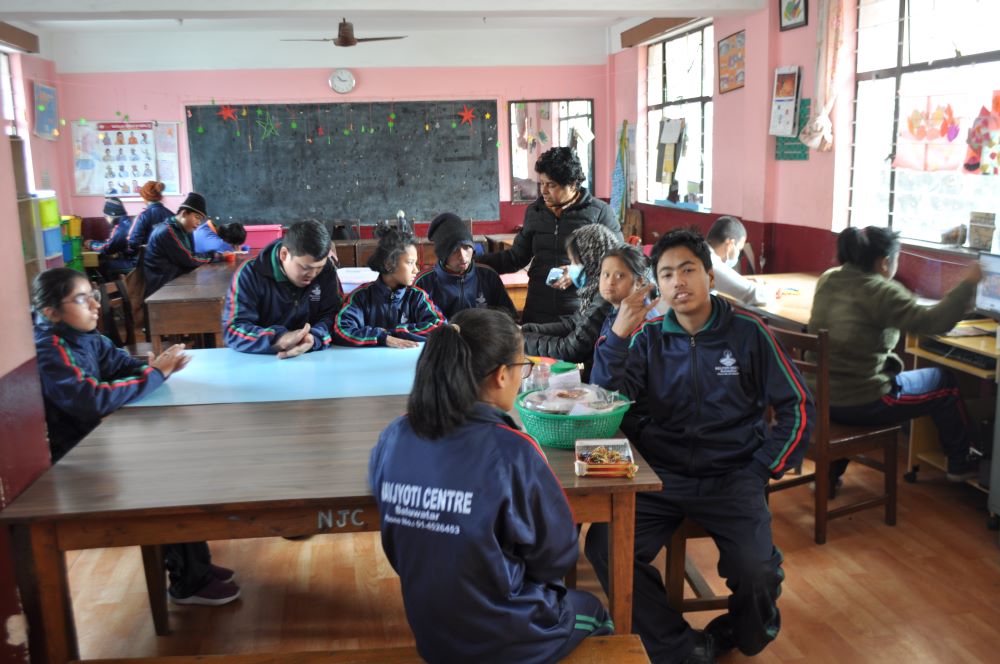
A student makes a mat at the vocational class at Navjyoti Centre, in Kathmandu, Nepal. The center, run by Sisters of Charity of Nazareth, teaches vocational skills that include bead making, mat weaving, cooking, gardening, envelope/candle/paper bag making, tailoring and knitting. (Pragati Shahi)
On a cold Wednesday morning in December, the outdoor play area of Navjyoti Centre, a day care school for children and young people with disabilities is buzzing with activity. Students take turns shooting a basketball into the hoop while a group of younger children plays on a blue plastic slide.
As the clock strikes 10 a.m., the school bell rings loudly, and the teachers walk the students toward the hall on the top floor of the two-storied building located in the heart of Kathmandu.
Once the teachers and students gather for a morning assembly, Kabita Tamang, 20, heads the assembly with a microphone in her hand, greeting everyone and beginning the half-hour session by reciting a prayer, followed by the national anthem of Nepal. The teachers and students inside the hall match Kabita's rhythm and mirror her movements as they take part in warm-up activities and Zumba dance with music playing in the background.
Just a few years ago, the thought of Kabita standing in front of a group of people and communicating would have been nearly unthinkable, said Sr. Lisa Perekkatt of the Sisters of Charity of Nazareth. Kabita, whose name has been changed to protect her identity, has a neurodevelopmental condition that is marked by low IQ and difficulty with everyday functions and communication. She was sexually assaulted by her landlord at age 14, and was rescued by Kumudini Nepal, a nongovernmental organization that helps girls who are victims of abuse and exploitation, before joining Navjyoti in 2019.
"When she was brought to the center, she had difficulty following instructions and showed disruptive behavior that was difficult to manage at times. She could not maintain eye contact and communication was almost nil," said Durga Pokharel, a 43-year-old laywoman who joined the school as a teacher nearly two and half decades ago. Kabita had difficulty staying focused and remained unresponsive or ran away whenever the teachers tried to communicate, Pokharel recalled.
"She had disruptive behavior problems and was at high risk of self-harming and harming others in the class, including teachers," Pokharel said. "She couldn't take care of the basic hygiene and self-cleanliness." But now, nearly five years later, Kabita is one of the "star" students who has taken up the responsibility to lead the morning assembly. Kabita also is now able to accomplish household chores like cooking, washing clothes and taking care of herself when at home.
"I am grateful to the Catholic sisters for their love and care toward my daughter. My daughter needed special care and even though we are the parents, sometimes it becomes overwhelming and burdensome to take care of her. However, the teachers at Navjyoti have taken care of my daughter and other children like their own," said Nirmala Tamang, Kabita's mother.
Tamang, 35, works as kitchen staff in Kathmandu. "My daughter's life would have been miserable if she hadn't come in touch with the sisters and their special day care school," she said.

Students of the Navjyoti Centre in Kathmandu, Nepal, participate in the day care school's morning assembly. The center currently serves 65 children and youth, ages 6 to 27, with mild, moderate and severe neurodevelopmental disorders and physical disabilities. (Pragati Shahi)
According to Nirmala, though Kabita's disability was diagnosed during a medical checkup after the assault at age 14, the family had noticed Kabita's difficulty reading and writing compared to her younger siblings, as well as her aggressive and abrupt behavior. Kabita wasn't able to continue her studies at a mainstream school, and like the majority of children with disabilities, Kabita had to drop out in the fourth grade.
At least 207,000 children in Nepal have a disability, according to a report by Human Rights Watch published in 2011. The United Nations Children’s Fund report in 2016 stated that among the children with special needs ages 5 to 12, 30.6% did not attend school in Nepal due to inaccessible educational environments and discrimination. Children with disabilities face numerous educational challenges, including a lack of accessible schools including accessible toilets, specialized instructional materials and teaching staff, and negative attitudes from teachers and peers, the report stated.
Although Nepal has formulated several new policies and shown commitments both at national and international forums to promote and safeguard disability rights, children with disabilities continue to face discrimination and social stigma. Of the total 34,000 schools in the country, only 1% are prepared to help children with disabilities. According to data provided by the Center for Education and Human Resource Development under the Ministry of Education, Science and Technology, there are 380 resource classes, 33 special schools and 23 inclusive schools in operation to provide education for 66,551 children with disabilities in the country. There are no government-run day care schools or centers.
The Navjyoti Centre was founded by Fr. Adam Gudlefsky, a Maryknoll priest from the United States, who was moved during his stay in Nepal by the plight of children who had mental disabilities and often neglected by society and the state. Gudlefsky opened a center in 1978 for five children and helped them with personal and social education. The Sisters of Charity of Nazareth took charge of the center in 1988 and started operating it as a day school under the name Navjyoti Centre. The day care school is registered under the Association for the Welfare of the Mentally Retarded (AWMR) and managed under the Nepal Nazareth Society, a nongovernmental organization run by the sisters.
Currently, Navjyoti serves as a second home for 65 children and youth, ages 6 to 27, with mild, moderate and severe neurodevelopmental disorders and physical disabilities, including Down syndrome, cerebral palsy, attention deficiency hyperactivity disorder (ADHD), autism spectrum disorder and learning issues. A total of 431 students have received support and services from the center since it began operation nearly four decades ago.

Sisters of Charity of Nazareth operate Navjyoti Centre in Kathmandu, Nepal. They took over the center, which provides education and training for children and young people with disabilities, in 1988. (Pragati Shahi)
"The school was established with an aim to provide an atmosphere of love, care and acceptance to those children who are in need of special care and help them live a respectful life with dignity," said Perekkatt, who is also the administrator of the school.
According to Perekkatt, the children come from different economic backgrounds, but the majority represent families in poor economic conditions. The students at Navjyoti do not follow a formal education syllabus, instead receiving life skills and vocational training to guide their holistic growth and ability to function on their own.
Nine specialized teaching staff engage students in arithmetic, self-care and personal hygiene, language and communication skills, singing and storytelling, drawing and painting, dance, yoga, speech therapy, games, physical exercises, physiotherapy, swimming, play therapy and health education classes. In addition to providing basic education, the day care that operates from 10 a.m. to 3 p.m helps students receive vocational skills such as bead making, mat weaving, cooking, gardening, envelope/candle/paper bag making, tailoring and knitting.
The day care school doesn't have a fee structure. Parents who can afford to pay do and those who cannot pay are not asked to do so, Perekkatt said. The center receives international donations and funding from the congregation to cover management and administrative costs, she added.
"The majority (of children with disabilities) live in a state of negligence and humiliation. We are committed to raise awareness and help the mentally challenged children who come to us for help to gain personal independence and happiness once they go back to their family and society," she said.
Perekkatt specializes in psychiatric nursing and worked in India before joining Navjyoti in 2013. That year, she lost her cousin, a youth with disabilities, to an unnatural death.
"I can empathize with the feelings of the parents who have to face the challenges of raising differently-abled children as I have witnessed it at a personal level," said Perekkatt.

Students work during a vocational class at Navjyoti Centre in Kathmandu, Nepal. Nine specialized teaching staff provide a wide range of programs at the center, which has been run by Sisters of Charity of Nazareth since 1988. (Pragati Shahi)
The students from the center have not only made their school proud but have also been able to exceed their parents' expectations.
Subhan Maharjan, 35, the parent of another "star" student at Navjyoti Centre is amazed to see her son's confidence surge since joining the center in 2021. Nineteen-year-old Sachin Maharjan was diagnosed with epilepsy and ADHD at age 8 and had been receiving medical treatment for his condition since then. Subhan, a homemaker and mother of two, has been tending to her son's needs and taking care of household chores while her husband supported the family working as a driver.
She struggled to deal with criticism and social stigma related to her son's disruptive behavior. "One of the doctors treating Sachin recommended Navjyoti to me and I brought my son here for admission," she said. "He has gone through a drastic transformation from an aggressive boy to a calm and helping hand in the kitchen for me."
Advertisement
Students from Navjyoti have excelled in sports and games both at the local and international levels. Some students have received gold medals in the international Special Olympics.
"When our students succeed, it gives me great satisfaction," Perekkatt said.
When GSR visited the center on Feb. 1, Kabita was attending the vocational skill class Pokharel led on the building's first floor. Kabita was stringing a blue beaded necklace while listening to a Nepali song playing on the computer at her desk. Beside her, Sachin was weaving a mat. Other students nearby were separating beads for making jewelry.
When the bell rang at 3 p.m. marking the end of the day at school, Kabita delivered the closing prayer, expressing gratitude to everyone who helped the children to end the day on a positive note. As the prayer concluded, the smiling students bid goodbye to their teacher and left the classroom.
"Thank you for everything," said Kabita, hugging Pokharel before exiting the classroom and heading toward the yellow school bus.






